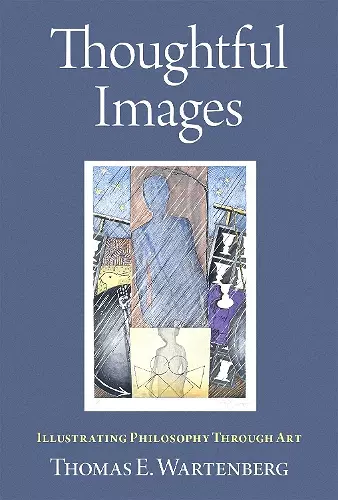Thoughtful Images
Illustrating Philosophy Through Art
Format:Hardback
Publisher:Oxford University Press Inc
Published:13th Mar '23
Currently unavailable, and unfortunately no date known when it will be back

Thoughtful Images demonstrates that there is a rich tradition of illustrations of philosophy that originated in Ancient Greece, spread throughout Europe, thrived in twentieth century America, and continues to this day. It is the first book to isolate this tradition and to explain its relevance for both philosophy and art. It's not surprising that philosophers and others have not acknowledged the existence of this artistic tradition. Illustration is not generally regarded as a genuine art form on a par with painting and sculpture and many believe that the abstract claims made by philosophers are not amenable to being rendered in visual images. Wartenberg shows that the denigration of illustration as an art form is misguided in a number of ways. The book argues that great works of art such as Titian's Rape of Europa are actually illustrations of literary texts-Ovid's Metamorphoses in Titian's case. This undermines the attempt to diminish the artistic achievement of illustrations by seeing them as an inferior art form to painting. That the abstract claims and theories put forward by philosophers are amenable to illustration is supported by the examples discussed in the balance of the book. These examples include illuminated Medieval manuscripts featuring illustrations of Aristotle's ethical theories; the frontispieces of philosophical works in the 17th and 18th century; Friedrich Nietzsche's, Martin Heidegger's, and Michel Foucault's use of paintings to illustrate their theories; the modernist tradition in which art is seen as a form of philosophy; conceptual artists' creation of works that explicitly include ideas taken from Ludwig Wittgenstein's writings; and works of what the author calls “graphic philosophy”-comic books that include visual representations of philosophical ideas.
In this truly groundbreaking endeavor, Wartenberg opens a surprisingly neglected topic to philosophical inquiry. Employing the notion of illustration, Wartenberg eruditely explores the diverse ways in which fine art abets philosophical understanding, including examples of how it can present original philosophical insight. Wartenberg's text is consistently historically informed and generous, contextually illuminating, aesthetically sensitive, and philosophically astute. This pioneering treatise will undoubtedly provide a source for philosophical conversation for years to come. * Noël Carroll, The Graduate Center, CUNY *
Wartenberg analyzes a range of examples of illustrations from various time periods and media that present the views of Plato, Aristotle, Hobbes, Rousseau, Nietzsche, Heidegger, Wittgenstein, and others. He argues that illustration can be a genuine artform, that pictures can 'do' philosophy in some ways better than words, and that illustrations can even advance philosophical positions for instance, in certain cases of abstract art and comics. This is a clear, original, erudite, and provocative book, which will interest philosophers, art historians, and other students of intellectual history. * Cynthia Freeland, University of Houston *
Wartenberg demonstrates that philosophical illustration has a long and fascinating history. He undercuts the common idea that illustration is an inferior artform, showing that illustrations can sometimes be great works of art themselves. This original and lucidly written book will intrigue not only philosophers, but anyone interested in the intersection of art and ideas. * Kathleen M. Higgins, University of Texas at Austin *
Richly illustrated, chock full of insights, this book exposes the secret life of images in the practice of philosophy. From Plato's diagrams to Mel Bochner's visualizations of Wittgenstein's ideas, to Scott McCloud's comic book presenting a philosophy of comics, Wartenberg brings out how images amplify and enrich philosophical reasoning. A must-read for anyone who cares about philosophy, images, or both. * Dominic McIver Lopes FRSC, University of British Columbia *
Thoughtful Images provides something altogether different, a theory of how philosophical theories have been illustrated...Thoughtful Images opens up such debate, presenting challenging issues which will inspire ongoing research...And that is a rare achievement. * David Carrier, Arion 31.1. *
In Thoughtful Images, they will find fertile ground for new research. * Michel-Antoine Xhignesse, Metascience *
One cannot overestimate the importance of Wartenberg's crucial project, which beautifully illustrates the role of the visual in the philosophical oeuvre and brings both visual philosophy and philosophical visuality into the wider discourse on aesthetics.... From the perspective of the visual turn of philosophy, Thoughtful Images, which explores the sphere in which philosophy spreads its wings, to be given also through images, is most welcome. * Analysis *
ISBN: 9780197650547
Dimensions: 198mm x 145mm x 48mm
Weight: 544g
344 pages